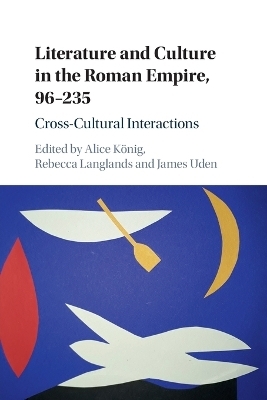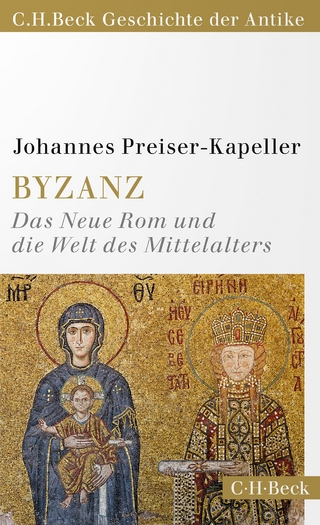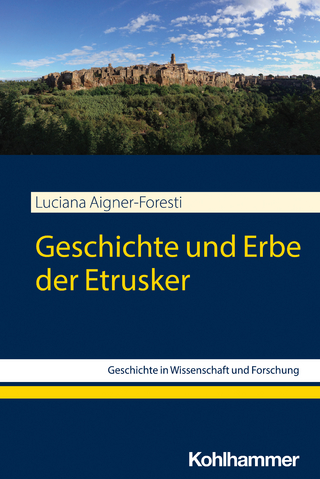
Literature and Culture in the Roman Empire, 96–235
Cambridge University Press (Verlag)
978-1-108-71371-9 (ISBN)
This book explores new ways of analysing interactions between different linguistic, cultural, and religious communities across the Roman Empire from the reign of Nerva to the Severans (96–235 CE). Bringing together leading scholars in classics with experts in the history of Judaism, Christianity and the Near East, it looks beyond the Greco-Roman binary that has dominated many studies of the period, and moves beyond traditional approaches to intertextuality in its study of the circulation of knowledge across languages and cultures. Its sixteen chapters explore shared ideas about aspects of imperial experience - law, patronage, architecture, the army - as well as the movement of ideas about history, exempla, documents and marvels. As the second volume in the Literary Interactions series, it offers a new and expansive vision of cross-cultural interaction in the Roman world, shedding light on connections that have gone previously unnoticed among the subcultures of a vast and evolving Empire.
Alice König is a Senior Lecturer in Classics at the University of St Andrews. She works on ancient technical literature and the history of science, and the relationship between politics, society and literature in the early principate. These two interests come together in a monograph she is preparing on the author and statesman, Sextus Julius Frontinus, and in a series of articles she has published on Vitruvius, Frontinus, Pliny the Younger and Tacitus. Alice established the 'Literary Interactions' research project in 2011, and is co-editor also of the project's first volume (on literary interactions under Nerva, Trajan and Hadrian), in which she has a chapter on Frontinus and Martial. She also co-directs a collaborative research project on 'Visualising War', looking at interplay between battle narratives in different genres and media from antiquity to the present day. Rebecca Langlands is Professor of Classics at the University of Exeter. Her research interests span Latin and Greek literature, ethics, Classical Reception and the history of gender and sexuality. Her books include Sexual Morality in Ancient Rome (Cambridge, 2006), Sex, Knowledge, and Receptions of the Past (edited with Kate Fisher, 2015) and Exemplary Ethics in Ancient Rome (Cambridge, 2018). She is director of the Centre for Knowledge in Culture in Antiquity and Beyond and co-director of the interdisciplinary Sexual Knowledge Unit at Exeter. She is also a founder and director of the award-winning Sex and History project, which works with museums, schools, charities and young people to promote empowering discussion of contemporary sexual issues. James Uden is an Associate Professor of Classical Studies at Boston University. He researches and writes broadly on Latin and Greek literature and the cultural history of the Roman Empire. He is the author of The Invisible Satirist: Juvenal and Second-Century Rome (2015) and has published articles on Catullus, Vergil, love elegy, fables, travel, and time. He is also interested in the transformation of classical ideas in English literature of the eighteenth and nineteenth centuries, and his forthcoming monograph, Spectres of Antiquity, shows how authors of Gothic novels and poetry wrote within the shadow of ancient texts.
Introduction Alice König, Rebecca Langlands and James Uden; Part I. Refiguring Roman and Greek Interactions: 1. Beyond Romans and others: identities in the long second century Myles Lavan; 2. The noise-lovers: cultures of speech and sound in second-century Rome James Uden; 3. Plutarch and Roman exemplary ethics: cultural interactions Rebecca Langlands; 4. Patronage, cultural difference and literary interactivity: the case of Pliny and Plutarch Dana Fields; 5. The romance of Republican history: narrative tension and resolution in Florus, Appian and Chariton Adam M. Kemezis; 6. Tactical interactions: dialogues between Greece and Rome in the military manuals of Aelian and Arrian Alice König; Part II. Imperial Infrastructure: Documents and Monuments: 7. Constructing a new imperial paradoxography: Phlegon of Tralles and his sources Kelly Shannon-Henderson; 8. A formation of a Christian archive? The case of Justin Martyr and an imperial rescript Laura Salah Nasrallah; 9. Keeping/losing records, keeping/losing faith: Suetonius and Justin do the document Tom Geue; 10. Shaping buildings into stories: architectural ekphrasis and the Epistle to the Ephesians in Roman literary culture J. Albert Harrill; 11. Architectural criticism in the Roman world and the limits of literary interaction Christopher Siwicki; 12. Dying for justice: narratives of Roman judicial authority in the High Empire Caillan Davenport; Part III. Cultural Translation and Transformation: 13. Bardaisan's disciples and ethnographic knowledge in the Roman Empire Nathanael Andrade; 14. Chaldean interactions Johannes Haubold; 15. Gilgamos in Rome: Aelian NA 12.21 Steven D. Smith; Afterword. Not there: empire, intertextuality, and absence Natalie B. Dohrmann; References; General index.
| Erscheinungsdatum | 27.03.2023 |
|---|---|
| Zusatzinfo | Worked examples or Exercises; 1 Maps; 6 Halftones, black and white |
| Verlagsort | Cambridge |
| Sprache | englisch |
| Maße | 152 x 229 mm |
| Gewicht | 613 g |
| Themenwelt | Geschichte ► Allgemeine Geschichte ► Altertum / Antike |
| Geschichte ► Teilgebiete der Geschichte ► Religionsgeschichte | |
| Religion / Theologie ► Christentum ► Kirchengeschichte | |
| Geisteswissenschaften ► Sprach- / Literaturwissenschaft ► Anglistik / Amerikanistik | |
| Geisteswissenschaften ► Sprach- / Literaturwissenschaft ► Literaturwissenschaft | |
| ISBN-10 | 1-108-71371-8 / 1108713718 |
| ISBN-13 | 978-1-108-71371-9 / 9781108713719 |
| Zustand | Neuware |
| Informationen gemäß Produktsicherheitsverordnung (GPSR) | |
| Haben Sie eine Frage zum Produkt? |
aus dem Bereich


